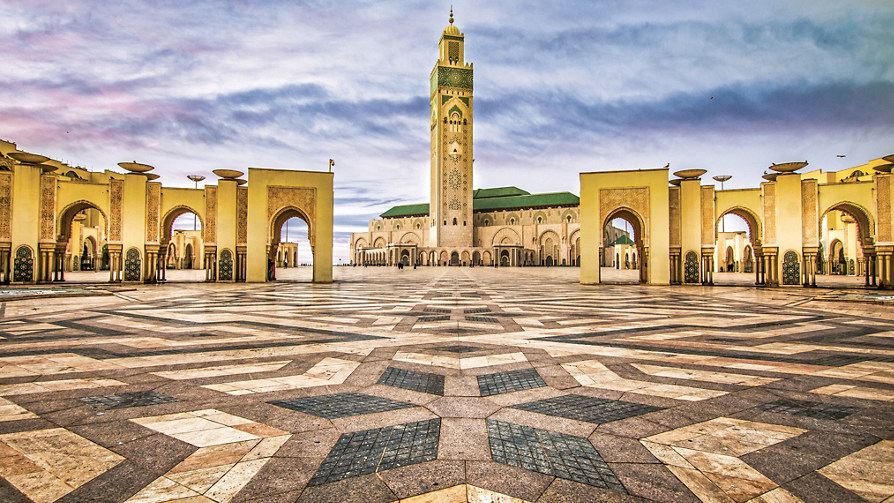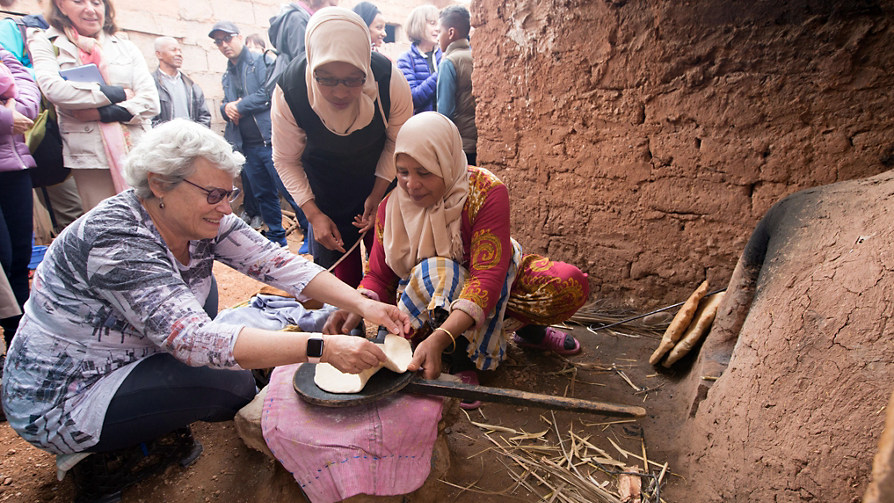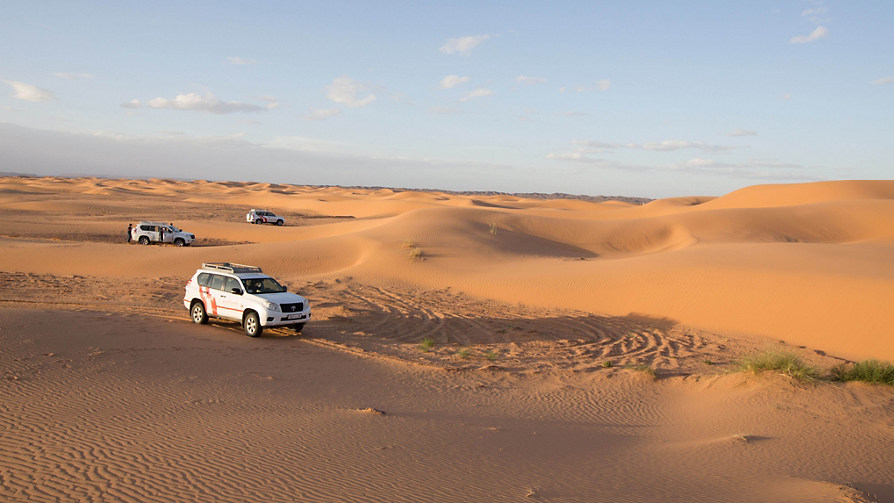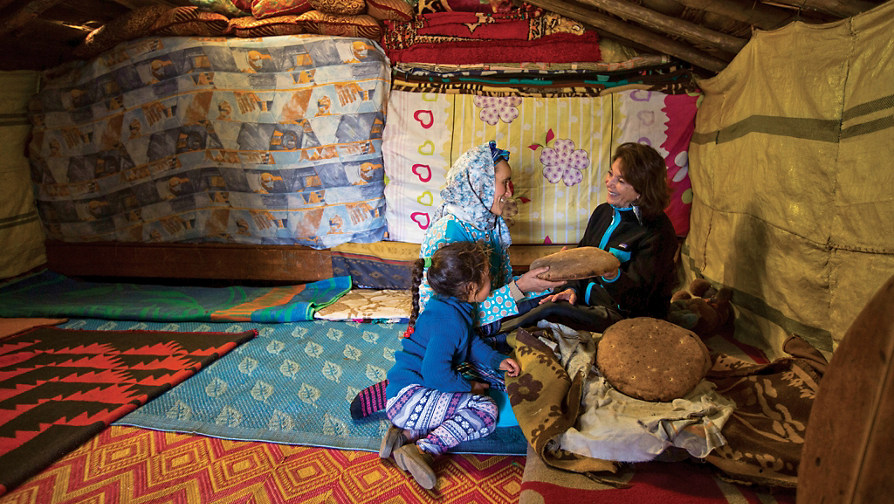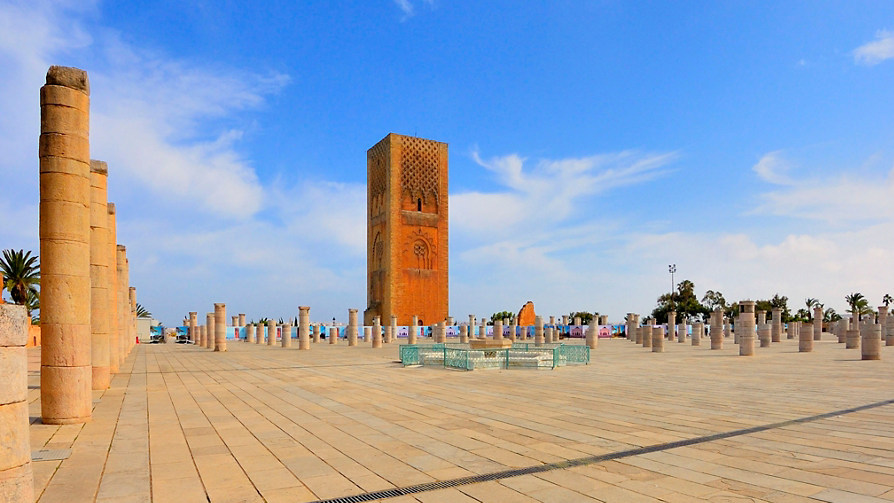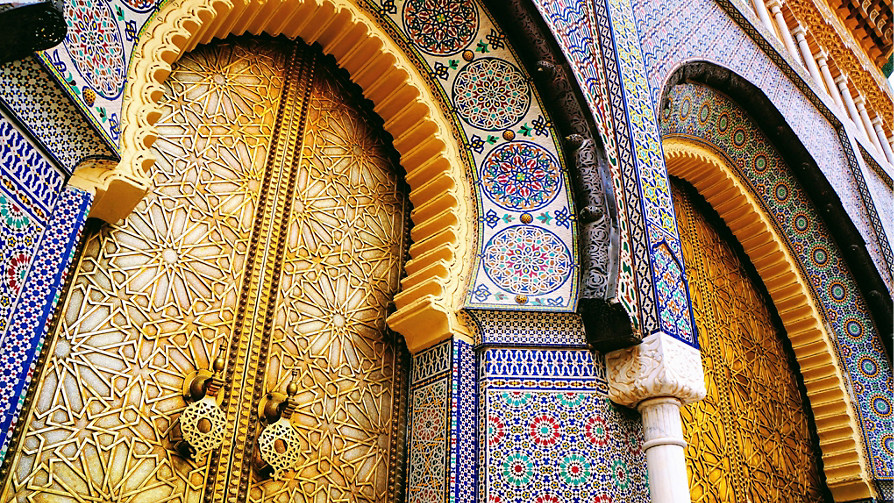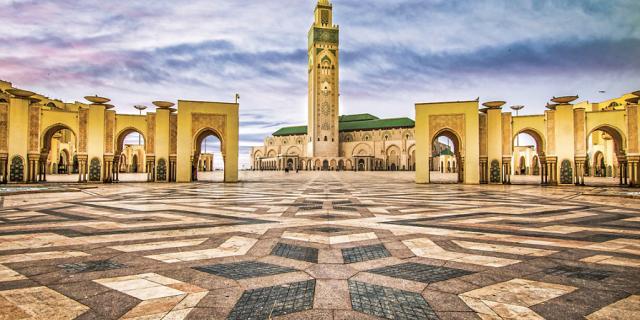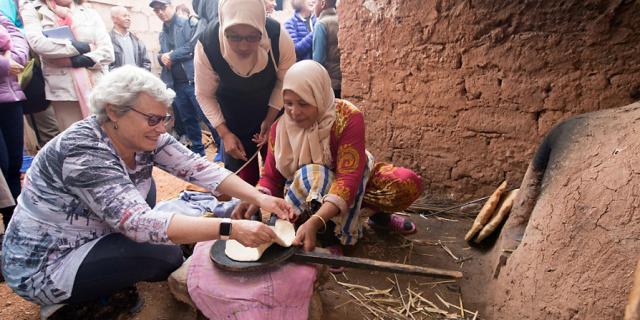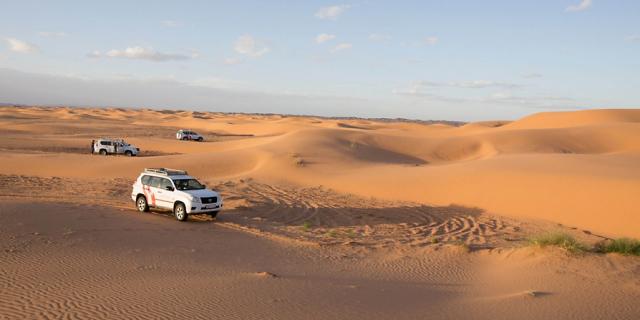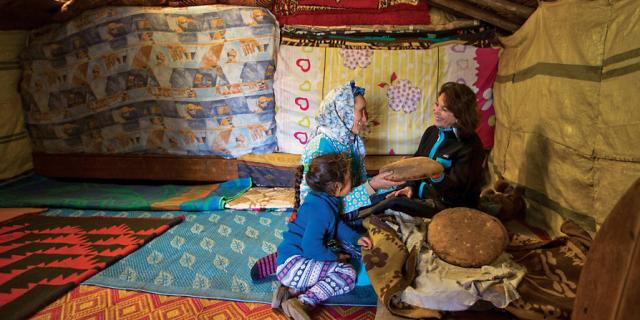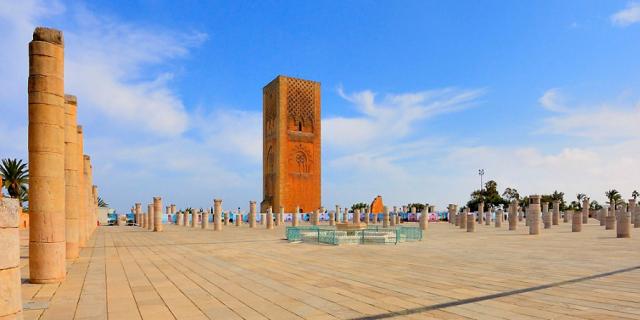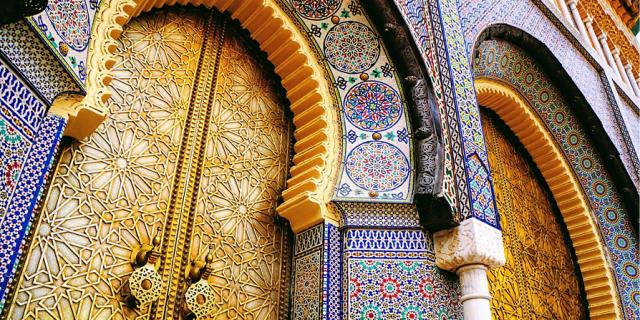- Accommodations for 14 nights (13 nights if you are taking our optional post-trip extension to Essaouira & Casablanca)
- 35 meals—14 breakfasts, 9 lunches, and 12 dinners, including 1 Home-Hosted Dinner (32 meals—still including 1 Home-Hosted Dinner—if you are taking our optional post-trip extension to Essaouira & Casablanca)
- 16 small group activities
- Explore in a small group of 8-16 travelers (average group size of 13)
- Services of a local O.A.T. Trip Experience Leader
- Gratuities for local guides, drivers, camp staff, and luggage porters
- 5% Frequent Traveler Credit toward your next adventure—an average of $275
- All land transportation
Please note:
Deposit requirement on land trips is $350
Past traveler savings of 5% if you traveled from 2018 onward
New travelers get $100 savings
Morocco travel enthralls even the most experienced adventurer. Tradition infuses its labyrinthine medinas, overflowing with centuries-old customs and the colorful bounty of the Earth. Village oases seem to rise from the desert, mirage-like. And the mighty Sahara, a timeless sea of sand, stretches to infinity.
During this comprehensive adventure, which has an 87% traveler excellence rating, we’ll truly get to know the people of Morocco, experience their traditions, and taste the secrets of their flavorful cuisine . We'll cross paths with nomads in remote stretches of desert, be welcomed in by locals for home-cooked meals and unforgettable conversation, and enjoy lively interactions with local Moroccans. Plus, we'll discover the beauty of Moroccan architecture—including a visit to Casablanca's remarkable Hassan II Mosque. Along the way, we'll enjoy intimate stays in authentic riads—Moroccan homes converted into elegant, ornately-tiled hotels with open-air, Andalusian-style courtyards. Plus, to get a true feel for how the Sahara has so decisively shaped this culture, we’ll camp under its starry skies in a tented camp for two nights—and even explore by camel.
Thanks to the small group size—just 8-16 travelers, with an average of 13—expert Trip Experience Leaders can bring you behind the scenes and off the beaten path to have authentic cultural experiences with local people. And whenever you’d like, you have the freedom to explore more of Morocco on your own: Break off from the group for independent discoveries—like wandering the Botanical Gardens of Rabat or exploring Marrakesh’s Women’s Museum—during free time.
DAY 1
Depart for Casablanca
Depart the U.S. today on an overnight flight to Casablanca, Morocco.
DAY 2
Arrive in Casablanca, Morocco • Overland to Rabat
Destination: Rabat
Meals included: D
Accommodations: Le Diwan Hotel or similar
Morning: Depending on your specific flight arrangements, you’ll arrive in Casablanca throughout the morning. An O.A.T. representative will greet you outside of the terminal and escort you to the bus for your 90-minute transfer to Rabat, one of Morocco's ancient imperial cities and its capital since 1913.
Lunch: Enjoy your first taste of Moroccan cuisine on our own—your Trip Experience Leader will recommend a local restaurant for you to try.
Afternoon: Around 2pm, you will check in and receive your room assignments at the hotel, where we still stay for two nights. Typical rooms feature a range of amenities including air-conditioning, a minibar, and a private en suite bathroom with a hair dryer. Hotel amenities include bar, spa, and brasserie. Your afternoon is free to explore Rabat, with about 4.5 hours to spend as you choose. Perhaps you'll explore the creative side of Morocco at the Villa des Arts. This site houses contemporary art that draws heavily on Moroccan heritage and focuses on themes centered around environmentalism, coexistence, and tolerance. Or, take a stroll through Rabat's Botanical Garden to witness over 650 species of plants, including rare varieties of tropical, sub-tropical, and succulents.
Later this afternoon, fellow travelers who took the optional pre-trip extensions to New! Andalusia & the Costa del Sol: Seville & Malaga or Northern Morocco: Chefchaouen, Tangier & the Berbers of the Rif will join the main adventure.
Dinner: We'll enjoy dinner at our hotel with a selection of traditional dishes at about 7:30pm.
Evening: You are free to spend your evening as you wish. Perhaps you'll retire to your room to rest after the long journey, or join travelers at the hotel to discuss your upcoming discoveries.
DAY 3
Explore Rabat • Controversial Topic: Refugees and poverty in Morocco with Asmae and Celia
Destination: Rabat
Meals included: B D
Accommodations: Le Diwan Hotel or similar
Exclusive O.A.T. Activity: Today's discoveries feature the Controversial Topic of immigration in Morocco. We’ll speak to a Moroccan citizen and a Nigerian refugee to hear two personal perspectives of why a growing number of refugees from sub-Saharan Africa have arrived in Morocco, and about the strain that such immigration has placed on the country’s economy. This eye-opening discovery of an uncomfortable truth of modern Moroccan life is likely to be a memorable experience—read more about it below.
Breakfast: Served buffet-style at the hotel featuring Moroccan dishes beginning at 7am.
Morning: Following breakfast, our Trip Experience Leader will give a Welcome Briefing at around 8:30am, during which we will introduce ourselves and review our itinerary in more detail (including any changes that may need to occur). Logistics, safety and emergency procedures, and any questions will also be discussed. Afterwards, we will delve into the basics of the Arabic language with our Trip Experience Leader.
Leaving the hotel behind us, we set out on an orientation walk with our Trip Experience Leader around 9:30am to familiarize ourselves with the surrounding area. We will stop at La Halinka, the oldest coffee shop in the region, to enjoy a traditional nos-nos—a half milk, half espresso drink. Opened in the 1970s, this rustic coffee shop is typically filled with the smells of coffee, and the loud chatter of retired Moroccans, who have come to spend time here during the week. We will interact with these locals and the wait staff, perhaps even the shop owner, to learn about daily life and the history of coffee in the region. Following our visit, we will continue to explore the cobbled streets of Rabat, seeking out opportunities to interact with the locals we come across.
At around 10:30am, we will drive by private motorcoach for about 30 minutes to visit the ruins and wild gardens of the Chellah, a 14th-century Merinid necropolis. We’ll spend about an hour exploring this UNESCO World Heritage Site, a fascinating blend of ancient Roman and medieval Muslim artifacts, and then return by private motorcoach to Rabat, where we’ll be dropped off in the city center around noon to enjoy lunch on our own.
Lunch: Your Trip Experience Leader can recommend some of their favorite options to enjoy on our own during your free time. Perhaps you'll sample a local seafood specialty like mussel tagine, a popular seafood stew cooked in a traditional earthenware pot.
Afternoon: We will reconvene around 1pm and drive by private motorcoach for about 15 minutes to Kasbah Oudeya, a citadel originally built in the twelfth-century. Many of the winding lanes are fringed with whitewashed homes intensely accented with a vibrant hue of blue. As we continue our exploration of the kasbah, we will make our way to the Andalusian gardens, which offer a shady retreat with its varying plant-life, such as oleanders, orange, lemon and banana trees. Perhaps we will take a step away from the bustle of the streets and enjoy the view of the Bou Regreg River.
At around 2pm, we’ll board our private motorcoach and drive for about 10 minutes to Pietri Square, where we’ll step out and walk to a local coffee shop run by refugees from sub-Saharan Africa. We’ll arrive at around 2:30pm and join two local women, Asmae Naara and Celia Omondiale, for a conversation about a Controversial Topic: The influx of sub-Saharan refugees into Morocco, and the stress it is placing on the nation’s already-strained social services.
Morocco, a nation of about 34 million people, is a common destination for refugees fleeing from war, poverty, and strife in sub-Saharan African nations. An estimated 700,000 immigrants currently live in the country seeking to build a better life, planning to either stay permanently, or as a midway point on their journey into Europe. As the number of undocumented immigrants grows, so does the problem of how to accommodate them in a nation already struggling with poverty and unemployment. In 2020, Morocco’s jobless rate rose to 12.3%—the highest it’s been since 2003—leaving immigrants and citizens alike to compete for limited resources, and ratcheting up the tension between the two segments of the population.
We’ll get a personal perspective of both sides of this controversial issue during our 1.5-hour long conversation. First, we’ll meet Asmae, a woman in her 20s that was born in Morocco and has lived here for her entire life. Asmae is a university graduate with a degree in literature and human sciences, and dreams of building a career out of teaching Arabic to Americans. However, the growing unemployment crisis—the jobless rate for youths like her is a staggering 33%—has put her plans on hold, and she currently lives with her parents while she seeks work. Asmae will talk to us about the day-to-day life of a young woman in Morocco, her struggles with rising unemployment and economic insecurity, and to what extent she believes the rising tide of immigration is responsible.
Then, we’ll get an immigrant’s perspective when we meet Celia, a refugee and single mother who traveled here from Nigeria in 2015. She’ll share the story of why she left her home country, how she traveled here while pregnant over a course of three months via bus and on foot, and about the challenges she and her son have faced since they arrived. Although she had originally planned to continue on to Europe, tightening borders and economic circumstances have left her stranded in Morocco for the time being, where she lives on the margins of society, taking small jobs as she can find them, and asking for money on the street when she can’t.
We’ll hear her perspective of how she and her fellow immigrants face each day while enduring discrimination from their Moroccan neighbors, and the threat of arrest and deportation by local authorities. A 2019 crackdown resulted in the arrest of more than 27,000 undocumented immigrants, and as the economic situation in Morocco worsens, the threat of such a thing happening again is ever-present.
Asmae and Celia will speak to us for about 20 minutes, and we’ll then have about 40 minutes to ask questions of our own to broaden our understanding of this difficult subject. Poverty and undocumented immigration is an ugly truth about life in Morocco, and one that many travel companies choose to gloss over. However, it’s an important one to discuss to understand the real issues that everyday people face in this country, and there’s no better way to get to the truth of the matter than to have honest conversations with local people that are deeply affected by it.
At around 4pm, we’ll say goodbye to Asmae and Celia, and then drive back to our hotel via private motorcoach. We’ll then have the rest of the afternoon to rest or explore independently before dinner.
Dinner: Around 6:15pm, we will board our coach for a 15-minute drive to a local restaurant. We'll enjoy a Welcome Dinner of traditional Moroccan cuisine and a glass of wine.
Evening: We arrive back at the hotel at about 8:15pm. The evening is on your own—you are free to return to your room to rest before your explorations tomorrow, or join fellow travelers in the main hotel area to discuss the day’s activities.
DAY 4
Overland to Fez • Hammam visit
Destination: Fez
Meals included: B L
Accommodations: Hotel Riad Salam or similar
Activity Note: Today, our transfer from Rabat to Fez will involve a 4- to 5-hour bus ride (with stops along the way) over roads that may be bumpy or uneven at times. Fez's medina (the old part of the city) can be dusty and crowded, and you’ll be exposed to local residents and their various living conditions, including poverty and beggars. These interactions may be distressing for some travelers. The crowded, narrow medinas are also a haven for pickpockets, and travelers should stay alert and be aware of their belongings and surroundings at all times. If this day falls on a Thursday, we will instead visit the medina on Day 6 to experience it on the weekend when it is at its liveliest.
Breakfast: Served buffet-style at the hotel featuring Moroccan dishes beginning at 6:30am.
Morning: Around 9am, we leave the coast and Rabat behind, and set off for Fez—locally referred to as Fes—driving about 1.5 hours to our first stop. We'll drive past sweeping fields, rolling countryside, and tree-covered slopes, some of which may be speckled with poppies, prickly pears, olive trees, or snow, depending on the time of year. En route around 10:30am, we will stop at the El Khemisset market for about 45 minutes of free time to explore. This market is teeming with local vendors, people, and livestock—as it has been for hundreds of years. As you peruse the narrow lanes of vendors, you can hear the pulsating noise of animals, locals chattering, and vendors enthusiastically peddling their products. You will have the unique opportunity to see locals in their daily routines at the market. Around 11:15am, we will board our bus and make the remaining 2-hour transfer to Fez.
Once we get to Fez around 1:15pm, we'll leave our bus behind in the modern city, and enter the medina—or old city—on foot. As we enter, let the colors and sounds of boisterous Fez envelope you. Vendors fill market stalls with colorful handcrafted goods, and on either side of us, donkey carts and motorbikes zip past as we carefully traverse the narrow, maze-like lanes of the ancient walled city. But, as we approach our riad, you'll never believe the peaceful haven awaiting us on the other side of the door. Upon arrival, our Trip Experience Leader will lead us on a brief orientation walk around the vicinity of the riad and point out places you can go in your free time.
Lunch: Traditional hot and cold dishes served at our riad upon arrival at around 1:15pm.
Afternoon: Following lunch, we'll check into our riad—a Moroccan home that has been refurbished into a guest house—around 2:15pm. With just around 20 rooms, our small group size lends itself perfectly to the intimacy and authenticity of a riad stay, and we'll get a true sense of local life as we share this traditional living space for the next three nights. A typical riad features intricate handmade tilework, and is multiple stories high, with rooms—each possessing their own distinct character—connected by a hallway that overlooks an open-air courtyard. Most riads don't feature elevators, and with their open layouts, it's not uncommon for the sounds of the city outside to make their way in to our living space. Depending on the centrally-located riad you stay in, it may be in walking distance to local street markets and shopping areas and feature an onsite restaurant. Typical rooms include satellite TV and air-conditioning. You'll have about 2 hours of free time to relax in your room or check out the local spots your Trip Experience Leader pointed out on our walk.
Around 4pm, we travel by private motorcoach to a traditional Moroccan hammam, a public steam bath. Popularized by the Roman empire more than 2,000 years ago, hammams have been a central part of daily and religious life in Morocco. A Moroccan hammam traditionally consists of a public bath house separated between men and women with multiple steam rooms, and attendants who scrub visitors with savon beldi, a black pigmented soap. Should you choose to partake in the local bathing culture, we will stop at a market to interact with vendors and purchase any products we may need for our visit, such as soaps or loofahs. While there, you will be able to interact with locals and gain a deeper understanding of how bath culture is tied to their social and religious lives.
We will depart the hammam around 5pm. You will have the remainder of your afternoon to relax more at the hotel or perhaps explore more of Fez.
Dinner: On your own tonight. Perhaps you'll venture to Café Clock for Western and Moroccan fare. Your Trip Experience Leader will be happy to provide you with other recommendations.
Evening: The evening is free to explore on your own. Perhaps you'll retire to your room or enjoy a drink with fellow travelers.
DAY 5
Explore Fez • Home-Hosted Dinner
Destination: Fez
Meals included: B L D
Accommodations: Hotel Riad Salam or similar
Exclusive O.A.T. Activity: This afternoon we'll venture into the home of a family in Fez, where we'll enjoy a Home-Hosted Dinner. This is a special opportunity afforded to us by our small group size and made by possible by the connections of our local Trip Experience Leaders. During our shared meal, you'll learn more about daily life in the Morocco from these residents, and take part in the customs and culinary traditions of the region. Read more about this experience below.
Activity Note: If this day falls on a Friday, we will drive to the panoramic viewpoint this morning instead of walk through the medina.
Breakfast: Served at the riad featuring Moroccan dishes beginning at 6:30am.
Morning: We'll begin our full-day exploration of Fez at about 8:15am this morning by motorcoach, arriving around 8:30am. Led by our Trip Experience Leader and a local city guide, we leave the 21st century and all previous conceptions of urban design behind as we enter Fez's medina, often considered the world's most well-preserved medieval city, and a UNESCO World Heritage Site. We start by exploring the traditional Jewish quarter, called the mellah.
Then we'll enter the souks (markets) of Fez around 9:30am, walking through myriad tiny lanes. This ancient section of Fez is a maze of narrow streets, and one of the largest car-free urban areas in the world. The benefit of being in the company of your Trip Experience Leader will become instantly clear, as navigating the winding medina is a code only a true local can crack. Every inch of space is filled with bazaars, cafés, shops, donkeys, and people. As you stroll the narrow lanes, age-old urban tradition will be on vibrant display, and the intensity of daily life will be bursting around every corner. The thrill of it must be experienced to be truly understood. We'll depart the market and walk to our lunch spot.
Lunch: Around 11:30am at an old Moroccan home that has been converted into a local restaurant, situated in the heart of the old medina, serving traditional Moroccan fare.
Afternoon: After lunch around 1pm, we continue exploring the medina as we hear the calls of the vendors selling their wares, watch artisans maintain their stalls, listen to shoppers haggle, and browse for gifts to take home. We'll board our bus and drive 15 minutes back to our riad, arriving around 2:30pm. Upon arrival, we enjoy about 3 hours of free time.
Then, at about 6pm, we'll split into smaller groups of no more than five travelers and board our bus to join local families for a Home-Hosted Dinner. The family you spend the evening with may live inside the old walls of the medina, or outside the historic center in what is referred to as the "New City." They may have school-aged children or be retirees. But all families will live in a private apartment and provide a welcoming and congenial atmosphere.
Dinner: Around 6:30pm in your host family's home, you'll get the chance to taste authentic regional cuisine. Expect to dine on typical Moroccan dishes such as harira, a popular soup made up tomatoes, chickpeas, and lentils; fassi, a lamb dish prepared with prunes; and myriad of Moroccan salads. For the families we visit, this is a great chance to practice their limited English. And for us, this is a unique opportunity to learn even more about daily life in this city as you personally connect with the family and ask your hosts about family dynamics, cultural norms, professions, and more. You might, for example, learn about Moroccan wedding traditions and have the chance to view a family's wedding day attire. Or perhaps you will learn more about the challenges of running a small business in Morocco.
Whatever the topic of your dinner-table discussion, your evening will be one to remember. You might even like to share with your hosts a little about what brings you to Morocco. Around 8pm, we will depart the our family's home and drive 30 minutes back to the riad.
Evening: Free for your own discoveries starting around 8:30pm. You can take some time for yourself, explore the surrounding area, or meet up with fellow travelers to discuss the day.
DAY 6
Fez • Controversial Topic: Moroccan patriarchy and women’s rights with Fatima Sadiqi • Optional Volubilis & Meknes tour
OPTIONAL TOUR
Destination: Fez
Meals included: B D
Accommodations: Hotel Riad Salam or similar
Activity Note: If Day 6 falls on a Saturday, the optional tour will be featured on Day 5 instead.
Exclusive O.A.T. Activity: Today's discoveries feature the Controversial Topic of sexism in Morocco. We will meet a local activist who has helped to reform the country’s laws to help guarantee equality for women, and hear firsthand how conservative mindsets within the country’s power structure form an ever-present obstacle to continued progress. While the topic may be uncomfortable, it is certain to be an enlightening cultural experience to broaden your understanding of life in Morocco—read more about it below.
Breakfast: Served at the riad featuring Moroccan dishes beginning at 7am.
Morning: The morning is yours to make your own discoveries in Fez. You may choose to take a walk through La Ville Nouvelle, an area whose French influence, and modern look and feel, offer a fascinating contrast to the traditional styles throughout most of Fez. Or, if flora is your forte, maybe you'll choose to visit the botanical garden just a 20-minute walk from our riad.
Or, you may join a full-day Optional Tour of two UNESCO World Heritage Sites, Volubilis and Meknes. We’ll walk back to the modern section of Fez to meet our bus around 8am, then set off for a 1-hour drive to the site. First we’ll explore Volubilis, one of the most well-preserved Roman cities in North Africa. Led by a local guide, we'll wander amongst its historic ruins and colorful mosaics, and our guide will help us envision what life was like in ancient times. From this vantage point, we'll have panoramic views of the whitewashed, holy city of Moulay Idriss in the distance. Then we’ll set off for a 30-minute drive to Meknes, onetime home of the Moroccan sultanate.
Lunch: On your own and your Trip Experience Leader can provide recommendations. However, if you have joined our Optional Tour, you will enjoy lunch upon arrival in Meknes around 11:15am at a local restaurant serving traditional Moroccan cuisine.
Afternoon: Travelers not on the Optional Tour will continue to enjoy free time and independent explorations early this afternoon. If you are on the Optional Tour, we will continue our explorations with a tour of the Old City in Meknes around 12:30pm, including the immense stables—a massive structure that once held 12,000 horses—and granaries that were built for 17th-century sultan Moulay Ismail. We will depart around 2pm for our hour-long journey back to the riad to join the rest of our small group.
At around 4pm, we will walk to the International Institute for Languages and Cultures, an educational institution focused on the study of contemporary history, culture, and gender in North Africa and the Middle East. Here, we’ll meet one of its co-founders, the activist and professor Fatima Sadiqui, for a conversation about a Controversial Topic: The impact of sharia law and conservative Moroccan culture on women’s rights, and how modern feminists are pushing back against traditional social norms today.
Morocco has historically been a patriarchal society, governed by conservative readings of Islamic sharia law which place women in a role subservient to men. The result has been a society in which women have fewer opportunities for advancement, and are subject to abuse and discrimination. The 2011 Arab Spring ushered in a wave of progressive changes, including a reformed constitution which places women on an equal legal footing with men—however, many of those fighting for change fear that conservative societal mindsets are a persistent threat to women’s rights today.
We’ll learn about this issue from Professor Sadiqi, a dedicated activist who has been at the frontline of the battle for women’s rights in Morocco for decades. Her advocacy work has been responsible for many of the reforms made in Morocco’s 2011 constitution, as well as subsequent legal reforms to guarantee the rights of women to live in peace and dignity—such as the 2014 repeal of Article 475, which allowed a rapist to avoid prosecution if he married his victim.
Professor Sadiqi will share her experiences with us for about 20 minutes, and then we’ll have the remainder of the hour to ask questions of our own to take advantage of her vast experience and expertise to learn about how the rights of women in Morocco have been improved, and about the threats that still exist. While the years since the Arab Spring have seen an increased number of legal protections for women, many women—especially those in marginalized communities like rural, poor urban, and Berber areas—find it difficult to take advantage of them in practice. Equality may be the law, but many people—including those in business, media, and other places within the country’s power structure—are set in the old ways of thinking, in which a woman’s place is in the home.
Discrimination against women is a difficult aspect of life in Morocco, and one which many people choose not to talk about. However, it’s a necessary one to examine in order to truly understand the lives of local people in this country. With our small group size, and the expertise of a woman who has spent her life and career fighting for equality, we will come away with a more intimate understanding of the issues affecting the lives of local women.
At around 5pm, we will bid Professor Sadiqi farewell and have 1.5 hours of free time before dinner.
Dinner: Traditional hot and cold dishes served at our riad around 6:30pm.
Evening: Free for your own discoveries. Ask your Trip Experience Leader for recommendations if you’d like to experience this city at night.
Volubilis & Meknes - $75/person
On this full-day optional excursion, we’ll explore two eye-opening, ancient sites.
First we’ll pass through the rolling countryside until we arrive at Volubilis, a UNESCO World Heritage Site; it’s one of the best-preserved Roman cities in North Africa. Led by a local guide, we'll wander amongst its historic ruins, where—peppered within the fragments of stone from ancient dwellings—we’ll behold a variety of striking, well-preserved mosaics, and our guide can help us envision what life was like in ancient times. From this vantage point, we'll also be able to look out upon the panoramic, whitewashed vistas of the holy city of Moulay Idriss in the distance.
Then we’ll set off for Meknes, onetime home of the Moroccan sultanate and a UNESCO World Heritage Site. After passing through the monumental gates of this walled city, we’ll stop for lunch at a local restaurant. Then we’ll embark upon a tour of the Old City, including the immense stables—a massive structure that once held 12,000 horses—and granaries that were built for 17th-century sultan, Moulay Ismail.
Please note: If Day 6 of this itinerary falls on a Saturday, this optional tour will be featured on Day 5 instead.
DAY 7
Cross the Middle & High Atlas Mountains • Overland to Erfoud
Destination: Erfoud
Meals included: B L D
Accommodations: Kasbah Hotel Chergui or similar
Activity Note: Today our transfer from Fez to Erfoud will involve a long bus ride, covering approximately 300 miles through the Middle and High Atlas Mountain range, over roads that may be bumpy, uneven, steep, and winding. Our total transfer time is up to 9 hours, especially in winter when road closures may lead to unexpected detours. We will break up the long transfer with stops along the way.
Breakfast: Served at the riad featuring Moroccan dishes beginning at 7am.
Morning: Our Sahara odyssey begins today at about 8am when we board our bus to drive across the Middle Atlas mountain range, winding through pine groves and giant cedar forests. The rich purple soil and the tall evergreens are quite a contrast against each other. We cross a 6,000-foot pass in the mountains and head further toward the Sahara. This long transfer will give our small group ample opportunity to witness the varied geologic and ecological zones we travel through and gain a deeper understanding of the regional landscapes. Around 9am, we will briefly stop in the ski resort town of Ifrane for the opportunity to take pictures of the quaint town. Afterwards around 9:15am we will continue our journey by bus. En route, we will stop to visit a semi-nomadic family (when possible, based on their availability). While here, we will enter into their tent and enjoy a cup of tea while discussing the nomadic way of life. Our small group affords us the unique opportunity to ask this family questions and understand their daily life. Following our visit, we will board our bus and continue our drive through thick cedar forests. Perhaps, you will spot the barbary macaque, a rare monkey species.
Lunch: At a local restaurant in Midelt around 12:30pm, featuring typical dishes of the area like trout. This village converted old mining grounds to fish farms, and is now famous for their trout farming.
Afternoon: We continue our drive through the High Atlas Mountains around 1:30pm, and in the late afternoon—at about 5pm—we descend into Erfoud, a small trading village that is the gateway to the vast Sahara Desert. When we arrive, we check into our hotel and receive our room assignments for our one-night stay. Situated on the outskirts of the Sahara Desert, the hotel you stay in may feature a restaurant, bar, and outdoor swimming pool. Typical rooms include air-conditioning, a minibar, a refrigerator, and a private bath.
Dinner: Traditional hot and cold Moroccan dishes served buffet-style at our hotel around 7pm.
Evening: Your evening is free to enjoy a night cap with fellow travelers at the hotel bar or rest before tomorrow’s journey into the Sahara Desert.
DAY 8
Off-road Sahara adventure • Overland to Sahara Desert camp • Meet local family
Destination: Sahara Desert
Meals included: B L D
Accommodations: Private tented camp
Activity Note: We will board 4x4 vehicles to make our way into the Sahara Desert over sand dunes. Total transfer time is about three hours.
Breakfast: Served buffet-style at the hotel featuring Moroccan dishes beginning at 7:30am.
Morning: At about 10am, we begin our day boarding 4x4 vehicles for a 20-minute ride to a local village. Here, we enjoy an O.A.T.-exclusive visit with members of a local desert community in their home to experience a traditional side of Moroccan life. Our Trip Experience Leader will help us communicate with the local family, and we encourage travelers to interact, ask questions, and learn more about this way of life. Afterwards around 11:15am, we board our 4x4 vehicles and head into the desert to continue our journey to our private tented campsite, located close to a sea of sand dunes near Merzouga. We arrive shortly after 12pm. During our 2-night stay, we'll experience the remote environment of the Sahara, with no roads, and the sound of the wind in the dunes as we navigate the sandy tracks.
At the camp, you’ll stay in a walk-in canvas tent, complete with camp bed, mattress, fresh linens, and pillow, and private en suite toilet facilities. There is a separate tent for dining.
Lunch: A selection of local and international dishes served in the dining tent upon arrival at the camp around 12:15pm.
Afternoon: You may enjoy about four hours of free time, during which you might discover more of the desert in a 4x4 vehicle. Or, perhaps you'd like to trek over the sand dunes where you can enjoy the dramatic views of the sun setting low over the desert stretching out around you. Then around 6pm, our local cook will give us a demonstration in preparing Moroccan cuisine. The chef will choose the menu, but it will likely center around couscous, a nourishing staple of Moroccan diets, along with other savory discoveries such as harissa, a fiery sauce made from hot red pepper, olive oil, and garlic; or tajine, a slow-cooked stew named for the pot that it's cooked in.
Dinner: Around 7pm at our campsite featuring local and international dishes.
Evening: The evening is free for you to enjoy the starry desert sky, spend time reflecting with fellow travelers, or rest.
DAY 9
Sahara Desert walk • Farm visit • Meet nomadic families in Khamlia
Destination: Sahara Desert
Meals included: B L D
Accommodations: Private tented camp
Early Morning: Today, we absorb the feeling of our desert environment. If you wish, your Trip Experience Leader will wake you up early to sit in the camp and watch the sunrise over the Sahara Desert, casting a golden light across the sprawling sand dunes. During the summer, the sun rises around 5am, but in the winter, it rises closer to 6am. Your Trip Experience Leader will then guide you on a short walk close to camp.
Breakfast: Served at the dining tent featuring Moroccan dishes beginning at 8am.
Morning: At about 8:45am, we'll "saddle up" to explore the desert dunes for about 45 minutes the traditional way—on the back of a camel (weather permitting). Then, our 4x4 vehicle takes us to a local farm at around 9:30am for an exclusive visit to learn about local produce and vegetation in the Sahara's unique climate.
Once our visit wraps up around 10:30am, we'll head to Khamlia, a remote desert village. This region is renowned for the ritual songs of its Gnawa musicians, and we'll get the chance to hear their melodic chants during a lively performance. Next, we'll get another perspective on life in the furthest corners of the Sahara when we drive to a nomadic village, an experience exclusive to O.A.T. travelers. During our visit, we’ll talk to the women of these families over a cup of tea to learn about their nomadic lifestyle and how they cook, maintain their home, educate their children, and more. Around 11:30am, we leave Khamlia via 4x4 vehicles to return to camp in time for lunch.
Lunch: Traditional hot and cold dishes served in the dining tent about 1:30pm.
Afternoon: You will have about 4 hours of free time this afternoon to spend as you wish. Perhaps you'll hike the dunes or venture by 4x4 vehicle around the desert. At around 6pm, we'll reconvene at the campsite for an in-depth conversation with your Trip Experience Leader about the basic tenets of Islam. Based around the five main pillars of the religion—faith, prayer, charity, fasting, and pilgrimage to Mecca—our conversation will illuminate the realities, misconceptions, and history behind the Islamic faith. During this interactive Q&A session, we encourage travelers to ask challenging questions. This is a great opportunity to gain a better understanding of religion, family dynamics, gender roles, and to dig deeper into Islam’s portrayal in the U.S. media compared to the reality of its practice in Morocco.
Dinner: A selection of local dishes served in the dining tent around 7:30pm.
Evening: We'll spend our last night gazing at the starry desert sky, where (weather permitting) the Milky Way may be clear and bright, and perhaps enjoying music and dancing with the camp staff.
DAY 10
Overland to Ouarzazate • Visit Berber museum
Destination: Ouarzazate
Meals included: B L D
Accommodations: Le Berbere Palace or similar
Activity Note: Our overland transfer to Ouarzazate will take about eight hours, including stops along the way.
Breakfast: Served at the dining tent featuring Moroccan dishes beginning from 7am-8am.
Morning: This morning around 8:30am, we leave the open desert behind and set off for the oasis town of Ouarzazate in our 4x4 vehicles. Including stops along the way, the entire transfer will take about 8 hours. En route, we'll stop to learn about khatarat, an old underground water system, then continue on our way to Tinejdad, arriving around 11:15am. Upon arrival, we'll visit the Ksar of El Khorbat and take a walk inside the ancient fortified ksar (a Berber walled city typically used to keep desert raiders out of Roman cities on the coast). We'll then visit a Berber museum founded by a local Jewish activist. We'll have about an hour to learn about the history, architecture, and daily life of Berbers in this region. While here, we'll also have a conversation with the founder about his perspective of the museum and its origins. Following our visit to the museum, we will walk to a local restaurant for lunch.
Lunch: At a local restaurant around noon, featuring traditional cuisine.
Afternoon: Around 1pm, we'll continue via coach for another 4 hours to Ouarzazate, a city built by the French as a garrison outpost in the Sahara. We'll arrive around 5pm to check in to our hotel.
For two nights, we’ll stay at a conveniently located hotel in the center of Ouarzazate, which may have an outdoor pool, as well as two restaurants, a bar, and health club with a sauna. Typical rooms will be modern with air-conditioning, a satellite TV, minibar, refrigerator, and private bath.
Dinner: A choice of Moroccan and international dishes served at the hotel around 7pm.
Evening: The evening is free to explore on your own, take advantage of the hotel amenities, or rest in your room.
DAY 11
A Day in the Life of Asfalou village • Visit Grand Circle Foundation Site: Imik Simik Women's Association • Explore Ouarzazate
Destination: Ouarzazate
Meals included: B L D
Accommodations: Le Berbere Palace or similar
Exclusive O.A.T. Activities: Today's discoveries feature A Day in the Life of the mountainside village of Asfalou. This exclusive O.A.T. activity offers an intimate glimpse to the day-to-day lives of everyday people as we immerse ourselves in a local community and join them where they live and work, and is likely to be a memorable moment of your adventure. We'll also visit the Grand Circle Foundation-sponsored Imik Simik Women's Association for Rural Development, which helps to further the education and skills of women in the area. Read more below.
Breakfast: Served buffet-style at the hotel featuring Moroccan dishes beginning at 7am.
Morning: Today, we visit Asfalou village, a mountainside town—departing the hotel in our bus around 9am for a 30-minute drive. We’ll first stop at a coffee shop in the nearby town of Aït Benhaddou, where we’ll pick up a local guide who will help facilitate our conversations in Asfalou, and to relax before continuing our drive.
We’ll then arrive at Asfalou at 10am, where we will have the opportunity to experience A Day in the Life of several aspects of the community, beginning with meeting a local family. We’ll step off the motorcoach and greet our hosts in their home to get a firsthand look at a typical family’s lifestyle in this region. Our host is a bricklayer, while his wife and children help out with farm work in the outlying fields, and can share their perspective of everyday life as a Berber in rural Morocco.
After a short walk around the fields, we’ll head back inside their home for some light refreshment. We’ll sip tea, then enjoy a light snack of bread and olive oil as we converse about life in the village. We’ll learn about the challenges of carving out an agrarian living in this arid region of Morocco, and about how the close proximity of Aït Benhaddou—a UNESCO World Heritage Site where major Hollywood productions are regularly filmed—affects their lives and the local economy.
At around 11am we’ll roll up our sleeves and help out with some village chores to gain a hands-on understanding of the day-to-day tasks that occupy the lives of the locals. Our host will point us in the direction of the work that needs to be done; you might help him craft bricks, or join his wife and daughters in the fields, where you’ll tend to the crops and help feed the animals. Some will help prepare the afternoon’s meal in the kitchen, which we’ll then share together.
Lunch: At around 12pm, we’ll sit down together at the family table for lunch. Our hosts will choose the menu, but it will likely feature regional specialties such as couscous or pastries, prepared from farm-fresh ingredients grown locally on the premises. We’ll spend about an hour dining together, offering more opportunities for intimate conversation about what life is like for Berbers in modern-day Morocco.
Afternoon: At around 1pm, we'll say goodbye to our hosts, then drive five minutes to visit the Grand Circle Foundation-sponsored Imik Simik Women's Association for Rural Development, an O.A.T.-exclusive site.
Shortly before 3pm, we'll say goodbye to the women at Imik Simik and board our bus for the return drive to our hotel. When we arrive, around 3:30pm, you'll have about 3.5 hours to explore on our own. You may choose to stroll through Ouarzazate's main square, sit down at one of the nearby cafés, or meander through the local flea market. We will gather at the hotel a little before 7pm to make the 5-minute drive by bus to dinner.
Dinner: At a local restaurant around 7pm, featuring a selection of international dishes.
Evening: The evening is free to explore on your own after we return to the hotel. Your Trip Experience Leader is happy to provide recommendations for the best ways to experience this city at night.
DAY 12
Cross High Atlas Mountains • Overland to Marrakesh • Explore Djemaa El Fna
Destination: Marrakesh
Meals included: B L
Accommodations: Hotel Riad Bahia Salam or similar
Activity Note: Our overland transfer today brings us to the highest altitude of the whole trip: more than 7,000 feet. It involves a 5-hour bus ride over roads that are steep and winding with stops included along the way. Marrakesh and its medina can be crowded.
Breakfast: Served buffet-style at the hotel featuring Moroccan dishes beginning at 7am.
Morning: Leaving our hotel by bus around 8am, we travel through the High Atlas Mountains today en route to Marrakesh. During the drive of about five hours, we'll pause high above narrow green valleys to take in sweeping views. In fact, we reach our highest altitude of the whole trip during this drive: more than 7,000 feet. On our journey, we'll pass by Tizi N'Tichka road, a dramatic, winding road through the peaks and valleys of the High Atlas Mountains. The road, at times, can appear carved into the mountainside.
Upon our arrival in Marrakesh around 1pm, we'll head to our riad where we'll enjoy lunch after our long drive.
Lunch: At our riad around 1:15pm, featuring traditional hot and cold dishes.
Afternoon: We check into our riad after lunch. Our home for the next three nights is located in the heart of Marrakesh, just a short walk to the old city's main square. Depending on the riad you stay in, it may feature a spa and sauna, on-site restaurant, and a rooftop terrace with views of the Atlas Mountains while typical guest rooms include air-conditioning, TV, and private bath.
We’ll enjoy about two hours at leisure, followed by a short orientation walk, then a walk to Djemaa El Fna around 4:30pm. Translating to "assembly of the dead"—in commemoration of public executions that occurred there in 1050 AD—Djemaa El Fna has taken on somewhat of a paradoxical nature, having blossomed into an area that is as full of life as the Sahara is full of sand. A cacophony of sounds fills the streets as musicians tune their instruments; snake charmers dazzle with their fascinating mix of danger and exotic ritual; food stalls line the streets; and a combination of horse-drawn carriages, motorbikes, and cars are relegated to the outskirts of the square as nightly pedestrian traffic takes center stage. This is a distinct locale for people-watching, and a great place to sample some local cuisine. You'll have about an hour free to explore the area on your own.
Dinner: Tonight, your Trip Experience Leader will lead you to their favorite food stalls so you can sample local favorites on your own. Afterwards, you’re free to continue to explore some of Marrakesh’s local cuisine on your own in the square.
Evening: Enjoy the freedom to explore on your own this evening or spend a night in to refresh before your days in Marrakesh.
DAY 13
Explore Marrakesh • Local interaction
Destination: Marrakesh
Meals included: B D
Accommodations: Hotel Riad Bahia Salam or similar
Breakfast: Served at the riad at 7am featuring Moroccan dishes.
Morning: Departing our hotel around 8:45am, your Trip Experience Leader will lead you on a 3-hour exploration of the legendary city of Marrakesh on foot. First we'll stop by the opulent Bahia Palace. This 19th-century palace houses 150 council rooms with large fireplaces and intricately painted cedar work lining the floor and walls. The open air Court of Honor is lined with vibrant tiles and flowing fountains.
Our tour continues at Le Jardin Secret, an opulent 400-year-old palatial estate featuring opulent architecture and immaculately-tended gardens. In ages past, the estate entertained Morocco’s most elite and influential political figures—today, you can wander the grounds and admire their beauty for yourself.
Next, we’ll visit the Koutoubia minaret, which houses the largest mosque in Marrakesh with it's minaret standing at 70 meters–the tallest structure in the city. In fact, local laws forbid any new structures from exceeding the height of the minaret. We’ll also explore the famous medina of Marrakesh, one of the ancient crossroads of North Africa and a UNESCO World Heritage Site. Our final stop is at a local bakery around 11:45am, where we'll have the chance to meet with the baker and learn about his traditional bread-making techniques.
Lunch: On your own around 12:15pm. Your Trip Experience Leader can recommend some of their favorite options.
Afternoon: After lunch, gather again around 1:15pm for the walk back to the hotel. Upon return, you have about 3 hours to spend as you wish, or join your Trip Experience Leader after lunch for an elective visit to see a demonstration of Berber weaving. As we watch and learn, your local Trip Experience Leader will explain the significance of the tradition as it relates to local history and culture, adding color to the experience. Afterwards around 4:45pm, your Trip Experience Leader will lead you on a deeper exploration of Marrakesh, but in a traditional horse-drawn caleche. As we cruise along the streets and narrow lanes, enjoy the sunset and bustling city squares.
Our carriage ride wraps up just before 6:30pm in front of a local restaurant.
Dinner: At a local restaurant featuring traditional fare from 6:30pm to 7:30pm.
Evening: After dinner, tonight is yours to explore Marrakesh and enjoy the city by night. Your Trip Experience Leader can provide recommendations of nighttime activities in the area.
DAY 14
Marrakesh • Controversial Topic: Feminism and youth activism with Yassamine, Chaimae, or Oumama • Optional tours
OPTIONAL TOUR
Destination: Marrakesh
Meals included: B D
Accommodations: Hotel Riad Bahia Salam or similar
Exclusive O.A.T. Activity: Today's discoveries offer a different perspective about the Controversial Topic of gender inequality in Morocco. We will meet one of three young women to get the point of view of a new generation of Moroccan feminist activists. We’ll get an intimate, firsthand view of how young women are challenging their traditional gender roles and fighting for a more equal future, no matter who gets in their way—even if it means defying their own families. Read more about this activity below.
Early Morning: Early risers are welcome to join our optional Marrakesh Hot-Air Balloon Ride this morning. An early wakeup call around 4:30am will be rewarded with the pre-dawn light illuminating the edge of Marrakesh and the backdrop of the Atlas Mountains. Departing around 5:15am, we'll board our 4x4 vehicles and drive for about 45 minutes before we reach the balloon site. Around 6:15am, we'll receive a 10-minute safety briefing from our pilot, and then we'll watch an expert team inflate and prepare our balloon. Afterwards, we'll ascend into the morning sky on a 1-hour hot-air balloon ride, which offers a unique perspective of Morocco. We may be able to see the traditional Berber villages or far off palm groves dotting the desert landscape.
Breakfast: For those taking the optional tour, breakfast will be served following your balloon ride around 8am. Traditional Moroccan food will be served at the balloon site. For those not taking the optional tour, breakfast will be served buffet-style at the riad featuring Moroccan and American dishes beginning at 8am.
Morning: Around 8:45am, travelers on the optional tour will depart the balloon site by 4x4 vehicles and drive 45 minutes back to the hotel. Your Trip Experience Leader will discuss possible options for your free day in Marrakesh, where past travelers have greatly enjoyed time for independent exploration. As in Fez, there is much to see, do, and buy in the bustling medina, and your Trip Experience Leader will be able to offer you plenty of suggestions about where to go.
Or, you can choose to join our optional Marrakesh Museums tour, which departs from the hotel around 9am and features visits to the Jardin de Majorelle and Islamic Art Museum; the Maison de la Photographie and The Museum of the Water Civilization; and a stroll through Marrakesh's ancient medina. You’ll have about an hour at each of the museums.
Lunch: On your own. Ask your Trip Experience Leader for their local favorites. If you joined the optional tour, you’ll join some local Moroccans for a roasted lamb lunch in a local restaurant at around 12:15pm. There will be vegetarian options available for those who do not eat lamb.
Afternoon: For those on the optional tour, you will return to the hotel around 1:30pm. At around 4pm, we’ll walk to Dar Chabab, a local youth center used for educational programs and to organize community events, where we’ll meet a young woman for a conversation about a Controversial Topic: the challenges faced by Morocco’s progressive youths in their fight for a more equal future for women.
Throughout our journey, we’ve learned about the discrimination and inequality that Moroccan women face in their day-to-day lives. We learned about the fight for equal rights from Professor Sadiqi in Fez, and we’ve seen it for ourselves throughout the country; from bustling cities like Rabat, to rural villages like Aït Benhaddou, and the remote communities of the Sahara Desert and the High Atlas Mountains.
Today, we meet a member of Morocco’s young generation charged with pushing for a brighter future, to learn about the values they fight for, and the unique challenges of being a young progressive in a society heretofore dominated by conservative traditions. With no formal right to free speech or separation between church and state, Morocco’s young women are torn between the competing pressures to pursue their dreams and to meet the traditional expectations of their family and faith. We’ll meet one of three young women who have decided to defy gender roles and fight for equality—and about the discord that their activism has caused within their communities and families.
We’ll meet one of three young women, each a Marrakesh local in her 20s, depending on their schedules and availability. We might speak to Yassamine Abourida, a medical student who was raised in a traditional religious household which adhered to conservative Islamic values. She spent the early years of her life behind a veil in accordance with Muslim tradition, but defied her family by removing it and pursuing a university education. Yassamine is a firm believer in the feminist movement, and has even made some progress in bringing her mother on board—with Yassamine’s support, she has enrolled in vocational classes to leave her life as a homemaker behind and pursue a career with the local government.
Or, we might meet Chaimae Benyamna, another medical student. The child of two science professors, Chaimae pursued an education with the full support of her parents, even though the liberal views she developed—and her decision to backpack alone in Europe for a month—became a source of conflict between her and her more conservative family. Her discord with her family and the patriarchal attitudes of some of her peers has been a source of doubt and tension in the background of her life, but ultimately her life experience has emboldened her desire to build a better and more equal future for Morocco’s women.
Alternatively, we may speak to Oumama Chikh, a journalist and translator whose parents believed in the value of education, and always pushed her to pursue her dreams and express her opinions freely, no matter what society might say. Unlike some of her peers, Oumama is also devoutly religious—she believes that there is room for faith in her fight, and Moroccan women can be free to worship without being held back by traditional gender roles.
While these three young women may be from different backgrounds, they are united in a common goal: Creating a future for Morocco in which women are free to pursue their hopes and dreams. Our speaker will spend about 20 minutes sharing their experiences and plans for the future, and we’ll then have the remainder of the hour to ask questions of our own to learn about daily life for young women in Morocco.
We’ll say our goodbyes around 5pm and then return to our riad.
Dinner: We'll gather at the hotel around 6:45pm for a 15-minute bus ride to a local restaurant. Around 7pm we'll enjoy a Farewell Dinner at a local restaurant and share our discoveries over traditional Moroccan cuisine as well as international dishes.
Evening: Your evening is yours to enjoy a final night in Marrakesh, making final visits to the medina or reminiscing about the trip with your fellow travelers over a nightcap.
Marrakesh Museums - $70/person
Begin your day surrounded by flowers and art at the Jardin Majorelle and Islamic Art Museum. The lovely landscaped gardens were designed by French artist Jacques Majorelle in the 1920s (and once owned by Yves Saint-Laurent) and feature a variety of exotic plants, flowers, and cacti. The museum’s collections include North African textiles, ceramics, jewelry, and paintings by Majorelle. Then we visit Maison de la Photographie, a museum showcasing powerful photos and old films of Morocco over the years; and the nearby Museum of the Water Civilization, which documents the ingenious engineering solutions that Moroccans have employed over the years to provide clean water for their daily needs. Then we journey behind the eleventh-century ramparts to explore the narrow streets of Marrakesh’s old fortified city, the medina, which is now a UNESCO World Heritage Site. Your optional tour concludes with a lunch with some Moroccans, who will share the secret of their special local treat—slow roasted leg of lamb.
DAY 15
Marrakesh • Women’s Solidarity Association • Overland to Casablanca & Hassan II Mosque
Destination: Casablanca
Meals included: B L
Accommodations: Radisson Blu Hotel Casablanca or similar
Activity Note: If Day 15 of your itinerary falls on a Sunday, the Women's Solidarity Association will not be open for visitors, and your included lunch will be at a local restaurant.
Travelers taking the post-trip extension will depart for Essaouira on Day 15 after breakfast. All other travelers will continue to Casablanca on a 3- to 4-hour bus ride over roads that may be bumpy or uneven. During our visit to the mosque, both men and women with exposed legs and upper arms will need to cover them. You will also need to remove your shoes while visiting the mosque.
Breakfast: Served buffet-style at the riad featuring Moroccan dishes beginning at 7:30am.
Morning: Following breakfast, any travelers taking our optional post-trip extension will depart for an overland transfer to Essaouira, leaving the main trip a day early, and experiencing Casablanca on Day 5 of the The Atlantic Coast: Artistic Essaouira & Casablanca post-trip extension instead of Day 15 of the main adventure. Those of us who will be returning to the U.S. after the main trip concludes will check out of our riad and depart for Casablanca by bus around 9am. During our 3- to 4-hour drive, we’ll enjoy another look at Morocco’s timeless landscapes.
Lunch: Around noon we'll arrive at the Women’s Solidarity Association in Casablanca. Founded in 1985, this non-profit organization provides professional experience to single women, mothers, and victims of abuse by training them to develop the skills needed to work in restaurants, bakeries, and hammams. At the restaurant, we’ll be treated to traditional cuisine prepared by the women of the association, and have the chance to get to know one of the women training there. This is a great opportunity to get a true sense of what life is like for women in Morocco, and we encourage travelers to interact, ask questions, and come away with a better understanding of local life. We'll depart the association around 2pm and drive by bus to our next destination.
Afternoon: At around 2:30pm, we’ll witness the towering Hassan II Mosque. This mosque is the largest in Morocco with the tallest minaret in the world. We’ll have about 1.5 hours at the mosque to admire its marble columns, intricately designed dome, and mosaic tiles. While here, you may even hear the call to prayer emanating from the towering minaret. We depart the mosque around 4pm for a 30-minute drive to our centrally-located hotel to check in and receive our room assignments for the night. Depending on the hotel, it may feature an onsite restaurant and lounge. Typical guestrooms include satellite television, air conditioning, bottled water, coffee- and tea-making facilities, and an en suite bathroom.
Dinner: On your own, around 6:30pm. Your Trip Experience Leader will be happy to provide suggestions on where to dine.
Evening: Tonight is free to explore Casablanca, gather with fellow travelers in the hotel lobby for one last drink to toast to the discoveries you’ve made together, or retire early before your morning flight.
DAY 16
Casablanca • Return to U.S.
Meals included: B
Activity Note: Many travelers will have a very early wake-up call around 3am to catch flights home to the U.S. Travelers who may have arranged later flights may discuss alternate plans with your Trip Experience Leader.
Breakfast: A light breakfast will be served at the hotel shortly after our 3am wake up.
Early Morning: Board our bus with your luggage around 3:30am and take about an hour drive to the airport for your return flight home. Or, begin your New! Historic Tunisia: Tunis, Kairouan & Ancient Carthage post-trip extension.
